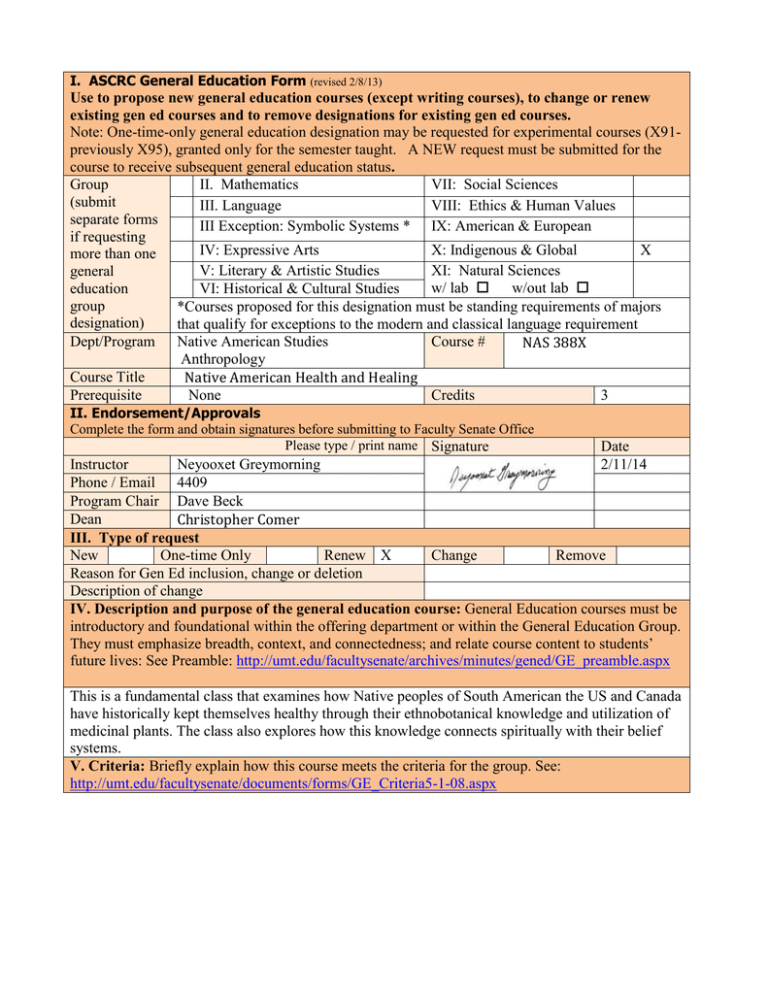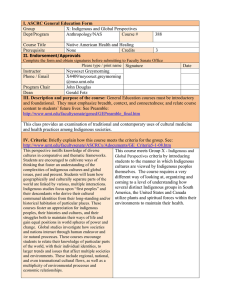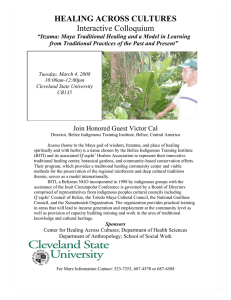Use to propose new general education courses (except writing courses),... existing gen ed courses and to remove designations for existing...
advertisement

I. ASCRC General Education Form (revised 2/8/13) Use to propose new general education courses (except writing courses), to change or renew existing gen ed courses and to remove designations for existing gen ed courses. Note: One-time-only general education designation may be requested for experimental courses (X91previously X95), granted only for the semester taught. A NEW request must be submitted for the course to receive subsequent general education status. Group II. Mathematics VII: Social Sciences (submit III. Language VIII: Ethics & Human Values separate forms III Exception: Symbolic Systems * IX: American & European if requesting IV: Expressive Arts X: Indigenous & Global X more than one V: Literary & Artistic Studies XI: Natural Sciences general w/ lab w/out lab education VI: Historical & Cultural Studies group *Courses proposed for this designation must be standing requirements of majors designation) that qualify for exceptions to the modern and classical language requirement Dept/Program Native American Studies Course # NAS 388X Anthropology Course Title Native American Health and Healing Prerequisite None Credits 3 II. Endorsement/Approvals Complete the form and obtain signatures before submitting to Faculty Senate Office Please type / print name Signature Date 2/11/14 Instructor Neyooxet Greymorning Phone / Email 4409 Program Chair Dave Beck Dean Christopher Comer III. Type of request New One-time Only Renew X Change Remove Reason for Gen Ed inclusion, change or deletion Description of change IV. Description and purpose of the general education course: General Education courses must be introductory and foundational within the offering department or within the General Education Group. They must emphasize breadth, context, and connectedness; and relate course content to students’ future lives: See Preamble: http://umt.edu/facultysenate/archives/minutes/gened/GE_preamble.aspx This is a fundamental class that examines how Native peoples of South American the US and Canada have historically kept themselves healthy through their ethnobotanical knowledge and utilization of medicinal plants. The class also explores how this knowledge connects spiritually with their belief systems. V. Criteria: Briefly explain how this course meets the criteria for the group. See: http://umt.edu/facultysenate/documents/forms/GE_Criteria5-1-08.aspx Indigenous & Global Perspectives Criteria 1. Indigenous and/or global courses will familiarize students with the values, histories, and institutions of two or more societies through the uses of comparative approaches. 2. Indigenous perspective courses address the longstanding tenure of a particular people in a particular geographical region, their histories, cultures, and ways of living as well as their interaction with other groups, indigenous and nonindigenous. Group X, Criteria one is met by familiarizing students with the health traditions, philosophy, and worldview of Indigenous peoples of the Americas. This is accomplished comparatively through reading, lectures, and discussions about Native Peoples form Canada, America, and South America. Criteria 2 is met through students examining, discussions and analyses of the histories, knowledge base and interrelationships that Native peoples have had with medicinal plants within their Native lands. The class covers three geographic areas, South America, where students will be exposed to the ethnobotanical knowledge the people have had to maintain their health, the US that integrates ethnobotony and spiritual knowledge that connects to their health and well-being, Canada where that knowledge has been integrated into western medicine. VI. Student Learning Goals: Briefly explain how this course will meet the applicable learning goals. See: http://umt.edu/facultysenate/documents/forms/GE_Criteria5-1-08.aspx Upon completion of a course in this perspective, 1) By the end of the course students will have examined and gained an appreciation of ethnobotanical knowledge base students will: that Native peoples have had and the impact that has had 1. place human behavior and cultural ideas and currently has upon Western medicine. into a wider (global/indigenous) 2) Students will examine and discuss concepts, framework, and enhance their reasoning and ethical issues that arise when Native understanding of the complex health practitioners knowledge of medicinal plants has interdependence of nations and societies been sought after by the pharmaceutical industry. By and their physical environments; the end of the course students will have examined, analyzed and gained an appreciation of the impact that 2. demonstrate an awareness of the diverse Indigenous people’s have had in the medical field of ways humans structure their social, Western society, and what that means with regard to political, and cultural lives; and the rights and responsibilities that Indigenous and non3. analyze and compare the rights and responsibilities of citizenship in the 21st century Indigenous. Students will demonstrate what has been learned by writing a final research paper in which they including those of their own societies and compare how two different culture groups might treat a cultures. certain illness or health issue; or the medicinal value of specific plants and their usages, etc, relating how this is relevant to course topic of “Native American Health and Healing. VII. Justification: Normally, general education courses will not carry pre-requisites, will carry at least 3 credits, and will be numbered at the 100-200 level. If the course has more than one prerequisite, carries fewer than three credits, or is upper division (numbered above the 200 level), provide rationale for exception(s). VIII. Syllabus: Paste syllabus below or attach and send digital copy with form. The syllabus should clearly describe how the above criteria are satisfied. For assistance on syllabus preparation see: http://teaching.berkeley.edu/bgd/syllabus.html Please note: Approved general education changes will take effect next fall. General education instructors will be expected to provide sample assessment items and corresponding responses to the Assessment Advisory Committee. NATIVE AMERICAN HEALTH AND HEALING Anthropology 388X /Cross Listed with Native American Studies Spring 2013 Outline Instructor: Neyooxet Greymorning Office Hours: Soc Sci. Bldg, Room 221 Mon. 11:30 – 12:30 and Office Phone: 243-8361 Class Hours: 2:10 - 5:00 Mon; NAS 103 Tues. NAS Bldg Room 203F 9:00-11:30 I. Required readings for this course will be drawn from the following resources: Tales of a Shaman's Apprentice, Sanapia & Cry of the Eagle, II. This course is designed to acquaint students with how Native health practitioners traditionally respond to health imbalances and the role that plants have played in Native approaches to health and healing. Students will gain this perspective through lectures, assigned readings and discussions. III. Objective: By the end of the course students should expect 1) to be familiar with aspects of ethnobotany, 2) to be familiar with the names of certain plants that possess medicinal value and 3) gain an understanding of how Native health practitioners traditionally respond to health imbalances. IV. Graded assignments: A. The Short Answer Exam is worth 50 pts and will consist of 4 short answers (10 pts ea.) and 5 identifications (2 pts ea.). B. The Mid Term is worth 50 pts and will consist of 20 multiple choice (1 pt ea.), 5 identifications (2 pts ea.), and 2 short answers (10 pts ea.) C. Each Group Presentation is worth a maximum of 50 pts. Assigned groups will be expected to present on a topic or issue involving an area of Native health and healing. Group presentations can cover areas such as the effectiveness of Native health practices, particular medicinal value of specific plants and their usages, a demonstration of how a plant might be used to treat a certain ailment, or how to prepare certain concoctions, potions elixirs salves etc. Every member of the group must participate in the presentation or the presentation will loose points. The presentation can cover a maximum of 35 minutes including time for questions. D. The Final Research Paper is worth 50 pts and should be a minimum of 2,000 words to a maximum of 2,200 words, approximately 10-12 pages in length. The paper should be properly referenced, with a properly written and formatted bibliography of no less than 6 references from 6 different resources, books, journals etc. of which only 2 can be internet references. Papers not adhering to the word length, bibliography and reference criteria will result in a lowered grade. Students must get their paper's topic approved by me first. Paper topics can be similar to group presentation topics mentioned in section C, or cover such aspects as; comparing how two different culture groups might treat a certain illness or health issue; Native health and healing from a psychological perspective, or the medicinal value of specific plants and their usages, etc, and must be relevant to course topic of “Native American Health and Healing. E. The final research paper is to be turned in during class on the date that it is due (April 26). If the research paper is turned in late, 2 points will be deducted for each day late. Any paper more than 7 days late, after the due date, will receive a grade of 0. V. Grading Scale: A = 181 - 200 D = 129 - 140 B = 161 - 180 F= 0 - 128 C = 141 - 160 Academic Honesty: Under no circumstances should students represent another person's work or ideas as their own. To do this is to plagiarize, and it is an intolerable offense in the academic community. Students who plagiarize will fail the assignment. NATIVE AMERICAN HEALTH AND HEALING Anthropology 388X /Cross Listed with Native American Studies Spring 2013 Outline WEEK DISCUSSION TOPICS READING ASSIGNMENTS TALES OF A SHAMAN'S APPRENTICE 1.Jan. 28 2.Feb. 4 Course Overview and Introduction The Lure of Healing Knowledge pages 1 - 18 and 53 - 80 Video: The Hawaiian Art of Healing Under the Rainbow Chapter 4; pages 81-125 3.Feb. 11 Curare Video: Medicine Man Questions from this video may appear on the Mid Term 4 Feb. 18 President’s Day No Class 5. Feb. 25 The Ethnocentrism of Colonialism Chapter 6; pages 159-199 A. Short Answer Exam covering chapters 1, 3, 4 & video 6. Mar. 4 The Craft of the Witch Doctor Video: The Yanomamo 7. Mar. 11 Comanche Historical and Cultural Background C. Group 1 presentation: 3:30 8. Mar. 18 Ghost Sickness, Witchcraft and Illness B. MID TERM 9. Mar 25 C. Group 2 presentation: 2:30 – 3:15 C. Group 3 presentation: 3:30 10. April 1-5 Spring Break 11. April 8 The Spiritual World C. Group 4 presentation: 3:30 12. April 15 Good and Bad Medicine C. Group 5 presentation: 3:30 13. April 22 Native Medicine for Non-Natives C. Group 6 presentation: 3:30 D. Final Research Paper Due April 26th 14. April 29 C. Group 7 presentation: 2:30 – 3:15 C. Group 8 presentation: 3:30 15. May 6 Case Histories Video: Gene Hunter 16. May 13-17 Finals Week Chapter 5; pages 126-158 Chapter 7; pages 200-238 Chapter 8; pages 239-271 SANAPIA Chapter 1 - 2 Chapter 3 - 5 CRY OF THE EAGLE Read to page 39 pages 40 -77 pages 78 -111 pages 112 – 138




